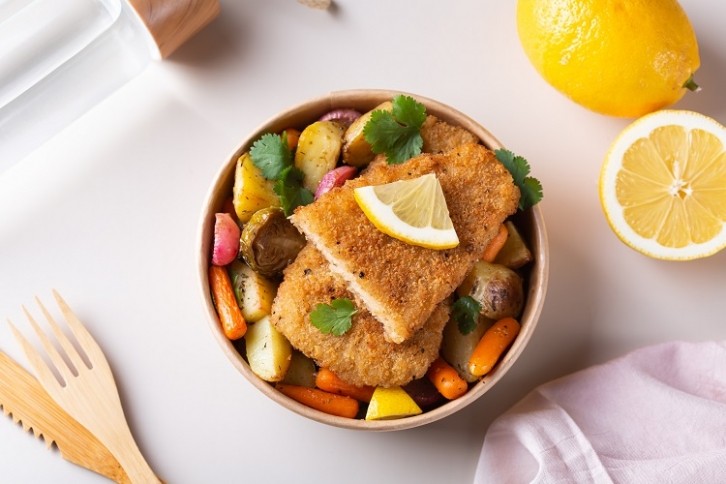Whether or not plant-based meat and dairy alternate options ought to use terminology linked to their animal supply counterparts (suppose ‘vegan burger’, ‘plant-based sausage’, or ‘dairy-free cream’) has been hotly debated in recent times.
In some jurisdictions, particular terminology is now banned for plant-based merchandise. Europe’s dairy-free market is case-in-point, the place you’ll now not discover ‘milk’, ‘butter’, ‘cheese’ and ‘yoghurt’ on the market within the plant-based aisle.
Meat and dairy alternate options have attracted a lot of the labelling consideration to this point, whereas seafood alternate options – which take a smaller share of each plant-based and seafood markets – have largely been off the hook.
However in Brussels final week, the labelling of vegetarian and vegan imitations of fish merchandise was completely on the menu: the seafood sector needs tighter rules for plant-based merchandise.
Clear labelling to combat fish fraud
On 29 November, the Committee on Fisheries (PECH) held a public listening to to deal with the regulatory framework surrounding the labelling of plant-based substitutes of fish merchandise and its impacts on the fisheries sector.
Because it stands, seafood alternate options will be marketed with ‘fishy’ terminology, equivalent to ‘plant-based salmon’ and ‘vegetarian fish sticks’.
In response to PECH, an insufficient regulatory framework dangers harming the fisheries sector by misdirecting shopper decisions, undermining honest competitors, and ‘eroding belief’ within the authenticity of seafood merchandise.

Article 7 of Regulation 1169/2011 states that meals data should not mislead and meals data have to be exact, clear and simply comprehensible for the buyer.
However plant-based seafood alternate options are deceptive shoppers, argued Claudia Benassi, marine biologist for Coldiretti Impresapesca Nationwide Confederation, who is asking for transparency labelling towards seafood fraud.
“Fish merchandise are at the moment the topic of quite a few frauds and imitations by plant-based merchandise which confuse shoppers and which threat compromising the competitiveness of the sector.
“There are even reverse frauds, i.e., non-vegan merchandise handed off as such.”
Growing the transparency of plant-based merchandise would shield seafood producers, who’re amongst probably the most in danger to fraud – ‘each from a well being and industrial viewpoint’.
Coldiretti needs the advertising of all merchandise of animal origin protected at EU-level towards ‘deceptive’ comparisons and evocations; and that the advertising of imitation plant-based merchandise be ‘absolutely and unequivocally’ differentiated from that of animal merchandise.
Who’s banning ‘meaty’ or dairy-like phrases for plant-based merchandise?
France is mulling a ban on ‘meaty’ names for plant-based merchandise, and its not the one one.
South Africa has additionally banned ‘meaty’ denominations getting used on vegan merchandise, and Turkish laws now states the time period ‘cheese’ can’t be used to explain dairy-free alternate options. Final yr, the Turkish authorities additionally banned the manufacturing of vegan cheese alternate options.
At an EU stage, the European Courtroom of Justice carried out a ban on the usage of dairy names equivalent to ‘milk’, ‘butter’, ‘cheese’, and ‘yoghurt’ for purely plant-based merchandise (except coconut milk, peanut butter, almond milk and ice cream) again in 2017.
Three years later, the European Parliament voted towards a ban on ‘meaty’ terminology for plant-based alternate options equivalent to ‘burger’, ‘sausage’ or ‘steak’.
‘A plant-based product isn’t the identical as a plant-based weight loss plan’
One more reason shoppers could also be misled by the ‘fishy’ advertising of plant-based market comes all the way down to diet, in keeping with seafood stakeholders.
From a dietary viewpoint, fish and seafood merchandise wouldn’t have alternate options or replacements, pressured Yobana Bermúdez, president of the European Federation of Nationwide Organisations of Importers and Exporters of Fish (CEP) and chair of the Market Advisory Council (MAC).
However in keeping with latest findings from NielsenIQ and the Meals Trade Affiliation, near one-third (31%) of shoppers within the US buy seafood alternate options as a result of they imagine them to be extra nutritious or more healthy.
For the CEP president, shoppers are confused concerning the distinction between plant-based diets and plant-based merchandise. Though the time period ‘plant-based’ isn’t clearly outlined, it doesn’t essentially imply chopping out meat, poultry, seafood, eggs and dairy from diets, however reasonably consuming extra meals from vegetation and fewer from animals, he defined. What it doesn’t imply is consuming processed plant-based merchandise as an alternative of typical alternate options.
It has not been proved that processed plant-based merchandise are wholesome, he continued, and aren’t advisable in ‘any weight loss plan’. “A plant-based product isn’t the identical as a plant-based weight loss plan.”
But it surely’s not all about processing. The dietary credentials of plant-based meat, dairy, and seafood have come below hearth for extreme salt and fats content material, in addition to their usually lengthy and complicated elements lists.
Tuna is wealthy in omega 3, nutritional vitamins B3 and B12, and comprises minerals equivalent to selenium, phosphorus and zinc. Components on a can of brined tuna are prone to embrace tuna, water, salt and pure flavours.
On the listening to, Roberto C. Alonso Baptista de Sousa, secretary basic of the Spanish Affiliation of Canned Fish Producers, president of Eurothon, and VP of APICE, took concern with Nestlé-owned Backyard Connoisseur’s plant-based tuna model ‘Vuna’, which is considerably extra calorie-dense (279kcal in comparison with 68kcal per 100g) and comprises 20% fats in comparison with less-than-1% in brined tuna. Additional, the elements listing is undoubtedly longer: water, pea protein, rapeseed oil, wheat gluten, flavourings, citric fibres and salt.
CEP’s Bermúdez recommends that transferring ahead, the dietary credentials of plant-based fish alternate options be taken into consideration, together with the principle elements and manufacturing strategies used to mimic the feel, sensorial properties, look, and flavour of fisheries and aquaculture merchandise.
The dietary and well being impacts of the substitute of fisheries and aquaculture proteins for plant-based merchandise, ‘notably extremely processed ones’, also needs to be thought of, he informed the listening to.
Nestlé vegan tuna model within the highlight: are shoppers confused?
In advertising vegan seafood merchandise in the same option to their typical counterparts, plant-based producers have been accused of offering deceptive meals data.
Backyard Connoisseur’s ‘Vuna’ is one such product to have been criticised by the secretary basic of the Spanish affiliation of canned fish producers, Baptista de Sousa.
From a terminology perspective, the product claims it ‘tastes like tuna’ and comprises ‘no fish’. The product’s textural look is suggestive of tuna, and its packaging (in a glass twist-top jar) is much like that of different tuna merchandise. It evocates canned tuna, pressured the secretary basic.
“For fish, it’s not enhancing sustainable diets, nor decreasing carbon footprint, or enhancing diets in any respect. It is just making a market to [grow] and promote a brand new product…making the most of fishery merchandise.”

However Rafael Pinto, coverage supervisor for the European Vegetarian Union (EVU), couldn’t disagree extra. Backyard Connoisseur’s Vuna product signifies it’s not tuna quite a few methods: it carries the V-Label (designated for vegan merchandise), says it’s ‘made with plant-based elements’, notes it’s ‘pea protein based mostly’, and twice states ‘no fish’ and ‘tastes like tuna’.
All up, Pinta stresses Backyard Connoisseur has indicated eight instances the product is plant-based, and subsequently not constructed from tuna.
Different plant-based seafood merchandise additionally point out their fish-free credentials on-pack, he continued. These embrace Iglo-owned Inexperienced Delicacies’s ‘Vegetarian Fish Sticks’, BettaF!sh’s TU-NAH product, and Heura’s ‘F’sh Fillets’.
Thanks to those indicators, shoppers aren’t deceived nor confused, instructed the EVU coverage supervisor. In response to analysis carried out by the European Client Organisation (BEUC), most shoppers don’t seem like involved concerning the naming of veggie ‘burgers’ or ‘sausages’, so long as the merchandise are clearly identifiable as vegetarian/vegan.
And in analysis carried out by the Gallup Institute this yr, 86% of shoppers mentioned that they had by no means purchased a plant-based product by mistake within the grocery store, with simply 3% reporting that that they had bought the improper product (a fish different) as an alternative of the actual factor.
Not solely are shoppers not confused, however the present rules are ‘match for function’, believes the EVU coverage supervisor. “Plant-based alternate options can use phrases related to animal merchandise so long as the plant-based nature of the meals is made clear.”

